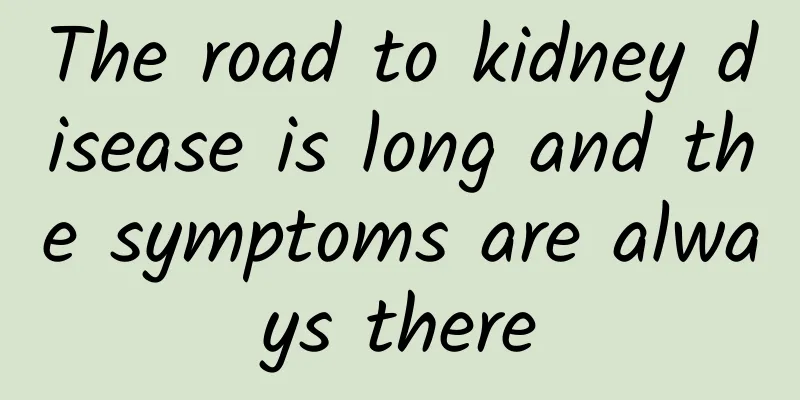The road to kidney disease is long and the symptoms are always there

|
Author: Chen Zhou, attending physician of the Nephrology Department of Shanghai Changhai Hospital Reviewer: Mei Xiaobin, Chief Physician, Nephrology Department, Shanghai Changhai Hospital Chronic kidney disease is a systemic disease whose symptoms usually worsen over time. Chronic kidney disease can be staged based on renal function indicators such as glomerular filtration rate (GFR), creatinine clearance and creatinine level. Chronic kidney disease staging helps to clarify the condition, so as to set prevention and treatment goals and take reasonable treatment measures. 1. How is chronic kidney disease staged? Chronic kidney disease is usually divided into 5 stages: Stage 1: GFR is normal, usually greater than 90 ml/min, and creatinine clearance is also within the normal range. The focus of treatment is on diagnosing and treating the primary disease to delay disease progression. Stage 2: GFR slightly decreased (60-89 ml/min), creatinine clearance may have slightly abnormal. The focus of prevention and treatment at this stage is to reduce the risk of cardiovascular disease and continue to treat the primary disease. Stage 3: GFR further decreases to 30-59 ml/min, which is considered a moderate decrease. The focus of treatment shifts to evaluating and preventing various possible complications. Stage 4: GFR is severely reduced to only 15-29 ml/min. At this time, it is necessary to actively prepare for renal replacement therapy, such as dialysis or kidney transplantation, to avoid serious complications. Stage 5: End-stage renal disease or uremia, GFR is less than 15ml/min, or the patient has received dialysis treatment. Treatment at this stage mainly focuses on pre-dialysis preparation and ongoing dialysis treatment. Figure 1 Copyright image, no permission to reprint 2. What should we pay attention to at each stage of chronic kidney disease? 1. Chronic kidney disease stage 1-2: early detection, early treatment, early control The early stage of chronic kidney disease is also the most easily overlooked stage. At this time, the patient may not have obvious symptoms, but renal function damage has already occurred. If it is not diagnosed in time and effective treatment is not taken, renal function will further decline. What needs to be done at this stage is: (1) Actively control the primary disease: Patients should strictly follow the doctor's instructions, take medication on time, and visit the nephrology clinic regularly for follow-up. The primary disease is often the root cause of chronic kidney disease, such as hypertension, diabetes, glomerulonephritis, etc. If the primary disease can be effectively controlled, the progression of chronic kidney disease can be delayed or prevented. (2) Control blood pressure: It is recommended to control blood pressure below 130/80 mmHg. Blood pressure is one of the important factors affecting kidney function. If blood pressure is too high, it will increase the burden on the kidneys and cause kidney damage. Therefore, patients should develop the habit of measuring blood pressure regularly. Once blood pressure is found to be high, seek medical attention in time and take antihypertensive drugs as prescribed by the doctor. (3) Control blood sugar: It is recommended to maintain the glycosylated hemoglobin level below 7%. High blood sugar levels can damage the microvascular structure of the kidneys and lead to decreased renal function. Patients should monitor their blood sugar and glycosylated hemoglobin levels regularly. If abnormalities are found, they should seek medical attention in a timely manner and take hypoglycemic drugs as prescribed by the doctor. (4) Healthy living: The dietary principles are the same as those of healthy people. It is recommended to adopt the DASH (Dietary Approaches to Stop Hypertension) model, which emphasizes low salt, low fat, and high fiber intake, which helps lower blood pressure, control weight, and prevent cardiovascular diseases. Patients are advised to exercise regularly, not smoke, not drink alcohol, not stay up late, etc., and maintain a good living habit. Figure 2 Copyright image, no permission to reprint 2. Chronic kidney disease stage 3-4 - slowing down progression and preventing complications This stage is the middle stage of chronic kidney disease and a critical stage in disease management. At this stage, patients will experience a series of symptoms, such as edema, high blood pressure and fatigue. Chronic kidney disease in stages 3 to 4 progresses rapidly. If timely and effective treatment is not taken, it will soon develop into the uremia stage. What needs to be done at this stage is: (1) High-quality low-protein diet: If nephrotic syndrome does not exist, a high-quality low-protein diet is recommended. The daily protein intake is 0.6-0.8 g/kg, mainly high-quality animal protein, such as milk, eggs, fish, etc. These foods can not only reduce the metabolic burden on the kidneys, but also slow down the rate of decline in renal function. (2) Low-salt diet: Reducing daily salt intake can better control blood pressure and improve edema. It is recommended that daily salt intake should not exceed 5g, which is equivalent to one teaspoon. (3) Standardized treatment of primary diseases and treatment of complications such as renal anemia and renal osteodystrophy: Take medications as prescribed by the doctor, such as antihypertensive drugs, hypoglycemic drugs, diuretics, iron supplements, erythropoietin, vitamin D, etc. These drugs help improve kidney blood circulation, increase the number of red blood cells, regulate calcium and phosphorus balance in the body, and effectively prevent the occurrence of cardiovascular complications. (4) Avoid self-medication: Do not use "tonics" on your own, do not listen to folk prescriptions or take drugs with unknown ingredients. Some drugs may cause damage to the kidneys, such as non-steroidal anti-inflammatory drugs, Chinese herbal medicines, etc. 3. Chronic kidney disease stage 5 (uremia stage) - maintain life and improve quality of life This stage is the late stage of chronic kidney disease, also known as end-stage renal disease (ESRD), commonly known as uremia, and is the most dangerous stage. At this time, kidney function is severely reduced and cannot maintain the excretion and metabolic functions required for life. Dialysis or kidney transplantation is required. What needs to be done at this stage is: (1) Make the right choice and preparation for dialysis: Dialysis is a treatment method that replaces kidney function, removes excess water and toxins from the body, and maintains electrolyte and acid-base balance. (2) Prevention of hyperkalemia: low-potassium diet, use potassium-raising drugs with caution, and test blood potassium regularly. Hyperkalemia is one of the most common and dangerous complications in patients with uremia, which can lead to arrhythmias or even cardiac arrest. Therefore, it is necessary to strictly control potassium intake and avoid eating foods high in potassium, such as bananas, citrus fruits, and nuts. If the patient takes certain drugs that may raise potassium, such as diuretics, angiotensin-converting enzyme inhibitors, etc., be sure to inform the doctor in time so that the medication regimen can be adjusted. In addition, test blood potassium levels regularly. If abnormalities are found, seek medical attention in time and take appropriate measures. (3) Control water intake: If the patient has decreased urination, systemic edema, heart failure, etc., water intake should be strictly limited and dialysis treatment should be performed if necessary. Excessive water intake can lead to high blood pressure, increased heart burden, and even dangerous conditions such as pulmonary edema. Water intake can be controlled according to the patient's urine volume and dialysis status. If the patient has obvious symptoms such as edema or difficulty breathing, he should seek medical attention in time. |
<<: Beautiful youth, fighting acne with tricks
>>: Caught off guard? Protecting the brain is urgent
Recommend
What is the cause of fever after cesarean section?
Caesarean section is a very common method of deli...
Do I need to hold my urine when doing 4D color Doppler ultrasound?
There is no need to hold urine when doing four-di...
37 weeks hard belly
If you find your stomach becomes hard at 37 weeks...
What happens when there is a lump of flesh at the vaginal opening?
A lump of flesh appears at the vaginal opening. T...
Causes of vaginal itching and leucorrhea odor
With the arrival of hot summer, vaginal itching, ...
How to check anemia in pregnant women
Iron deficiency anemia is very common in our live...
The best schedule for pregnant women
There are many pregnant women in our lives. For p...
White jelly-like substance flowing from the lower body
Girls should be familiar with vaginal discharge, ...
Side effects of ornidazole vaginal suppositories
We know that the female reproductive organs are v...
Why is there foam in a woman's urine?
Urinating can indeed represent the physical healt...
Where is the female groin?
Everyone has a groin, both men and women have gro...
7 ways to replenish blood during special periods in a woman's life
Goji berry blood supplement during follicular pha...
The vacation is over, but why do I seem to be more tired than before the vacation?
The ancients said: "When you need to use you...
Beer and barbecued crayfish...it turns out to be a "gout meal". How can we spend the summer in the future?
The temperature has been rising recently, and the...









